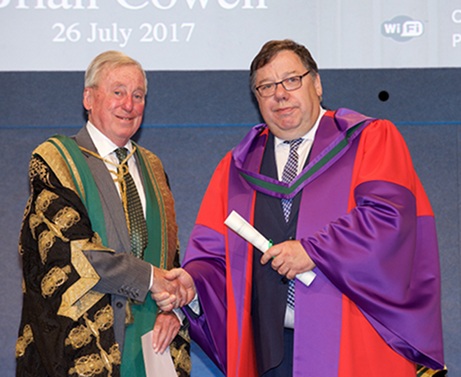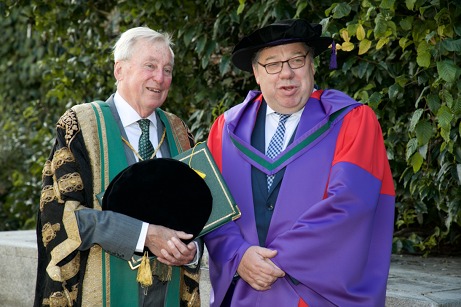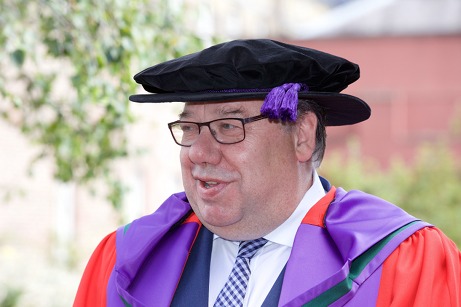26.07.2017
Hibernia Conference Centre, Dublin Castle
Wednesday 26 July 2017 at 5.00 pm
Citation Delivered by Professor Mary E. Daly
![]() Introductory Text Delivered by Professor Mary E. Daly (167kb)
Introductory Text Delivered by Professor Mary E. Daly (167kb)
To download this pdf to your computer right click the link above and save
 The Chancellor of the National University of Ireland Dr Maurice Manning today conferred the honorary degree Doctor of Laws (LLD) on former Taoiseach Mr Brian Cowen.
The Chancellor of the National University of Ireland Dr Maurice Manning today conferred the honorary degree Doctor of Laws (LLD) on former Taoiseach Mr Brian Cowen.
Introducing Mr Cowen, Professor Mary E. Daly MRIA assessed his career in Irish politics and highlighted his achievements in a number of ministries: as Minister for Transport, Energy and Communications in 1993/4, he initiated the Luas and later began the process of transforming Aer Lingus to ensure that the national airline would survive in a deregulated aviation market; as Minister for Health from 1997 to 2000 ‘his greatest achievement was to secure a major expansion in services for intellectual disability’. ‘He also sought to improve governance and accountability within the hospital sector, and apply ‘a structured coordinated and multidisciplinary approach – to tackling waiting lists – issues that have haunted successive ministers for health’; in Foreign Affairs,. Brian Cowen ‘played a crucial role in implementing the Good Friday Agreement: - decommissioning, reform of the police services, establishing a power-sharing government in Northern Ireland’.
Setting the context for Brian Cowen’s move to Finance in 2004 ‘a time of record economic growth, a booming property market fuelled by low interest rates, bulging tax revenues, and escalating demands for increased public expenditure and tax cuts, Professor Daly said that ‘ For several years it appeared that all could be delivered: - a budget surplus, falling national debt, an expanding National Pension Reserve Fund, coupled with higher spending’ and mentioned that Brian Cowen ‘provided the first support for child-care – which is now accepted as a mainstream item in national spending’.
Reflecting on Brian Cowen’s his beliefs and aspirations as reflected in his speeches, Professor Daly said ‘He is passionate about Ireland, but claims to be ‘more of a pragmatist than a visionary’ – a practical patriot like his hero Seán Lemass’.
However, from 2008 his ‘vision had to give way to crisis management; unprecedented challenges to political institutions and vilification of government ministers. The story of the Irish economy after 2008 is well-known: the bank bailout; property crash; soaring budgetary deficits; reductions in spending; tax increases, culminating in a request for a bailout and the arrival of the Troika in November 2010. That Brian Cowan, now Taoiseach had been Minister for Finance from 2004-08 added significantly to the personal responsibilities that were laid at his door’.
Concurring with Professor Brigid Laffan’s assessment (NUI Garret FitzGerald Lecture 2016) that ‘the Irish state was not found wanting in hard times and was unique among EU member states in taking steps to address the fiscal crisis in 2008’, Professor Daly said that ‘the adjustments were extremely painful, but they were implemented without major social unrest – in contrast to other countries. As Taoiseach Brian Cowen succeeded in holding a government together – albeit with defections – until most of the tough measures had been implemented. While the Troika has been widely blamed for imposing an austerity regime on Ireland, it is not fully recognised that the programme was drafted by the Cowen government, and it avoided cuts in basic social welfare and compulsory redundancies in the public sector. The Croke Park Agreement of June 2010 reflects the capacity to secure trade union support for some difficult decisions’. She conceded however that ‘the Taoiseach and his government failed to secure comparable support from the wider public’.
Quoting British Prime Minister Benjamin Disraeli who described becoming Prime Minister as being ‘on top of the greasy pole’, Professor Daly said that ‘Brian Cowen truly experienced that greasy pole. He has accepted the judgement of the electorate on the performance of the Cowen government without rancour. The only person in the history of the state to hold the four key offices of Minister for Foreign Affairs, Finance, Tanaiste and Taoiseach – he is still held in high regard by those who worked with him. Almost unique in an age of spin doctors and make-overs, he refused to conform, remaining true to his roots, and his habit of plain speaking’.
In a gracious and wideranging address, Brian Cowen thanked the Chancellor and the NUI Senate for conferring the honour on him saying ‘I know there are very many people who have spent years researching and working towards gaining their PhD. Out of respect for their academic achievement and excellence, I am prepared to allow use of the moniker 'Doctor', as it pertains to this ceremony, just for today!’
In the course of his address he set out his views on the importance of education, emphasing the importance of individuality and imagination
‘I think for graduates, the real ones not those getting honorary awards – whether they have degrees in medicine, the Arts, computer science, psychology or whatever - if I’d an appeal to make to you it would be to preserve that piece of your individuality and find ways of allowing it expression within your professional lives.’
Brian Cowen identified the high points of his career in political life, highlighting the advances made on Northern ireland through the Downing Street Declaration, the ceasefires, the Good Friday Agreement. and the later St. Andrew's Agreement, commenting that these ‘mark the victory of democratic, constitutional politics as the only means of settling differences on this island’.
Commenting the important role played by EU membership since 1973 in facilitating high level dialogue between Ireland and the UK he said ‘We need to give some thought to how and in what way that important interaction and opportunity common EU membership gives us in exchanging views on important matters of the day is to be replicated when Britain's membership of the EU ends’.
Outlining the international context of the economic crisis from 2008, and the particular national weaknesses which made Ireland particularly vulnerable, Brian Cowen acknowledged the hardship that was experienced:
The greatest hardship of the recession was the loss of employment for so many of our people - something which I deeply regret. Hardworking men and women who ask only for the chance to work to support themselves and their families were denied that opportunity by the cruel reality of an economic downturn that impacted upon millions across the world. 250,000 of our 2 million workforce lost jobs, the vast majority in construction and related industries and in retail.
He set out the measures taken by his government to address the crisis, to stabilise the economy and to control public spending and also to create a framework for economic renewal, noting that all of the key actions taken by the Government were subsequently built on by the new government who deserve credit for continuing with the policies which we had started.
Brian Cowen placed particular emphasis on the key strategic initiatives in education referencing Cycle 5 of the Programme for Research in Third Level Institutions (PRTLI) announced in July 2010 and which provided funding for third level research infrastructure, national shared facilities and structured PhD programmes. Cycle 5 involved 38 projects with total funding of €360m envisaged over the period to 2016.
In conclusion, he said I was always proud to serve my Party and my country in anyway I was asked. I thank my family particularly, my many friends and supporters who walked with me on my eventful political journey every step of the way. I thank all my political colleagues with whom I worked down the years. I want to pay tribute to the integrity and efforts of the public servants who worked to me in every Department in which I served and as Taoiseach. Their sense of the State and their integrity were in the finest traditions of the Irish Civil Service. I wish all well who are in political life. Given the recent election result, it certainly isn't getting any easier. But I know you will all meet your obligation to make it work for all our people.
The full text of Brian Cowen’s address is below:
Address Given by Dr Brian Cowen
![]() Brian Cowen Honorary Conferring Address: 204kb
Brian Cowen Honorary Conferring Address: 204kb
To download this pdf to your computer right click the link above and save






















